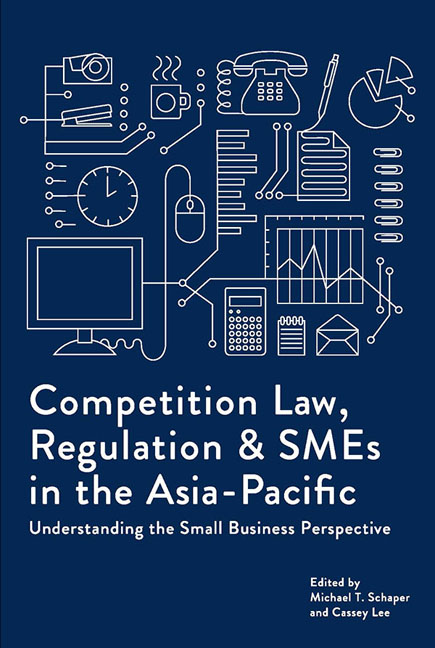 Competition Law, Regulation and SMEs in the Asia-Pacific
Competition Law, Regulation and SMEs in the Asia-Pacific 1 - Introduction: Making the Invisible SME More Visible in Competition Policy and Law
Published online by Cambridge University Press: 05 August 2017
Summary
Introduction
Small and medium-sized enterprises (SMEs) are the biggest single group of businesses to be found globally, and represent the overwhelming majority of trading enterprises in almost every regulatory jurisdiction around the world. The importance of SMEs is reflected in the presence of industrial policies supporting SME development in many countries. Curiously, however, SMEs are almost invisible when competition policy and law issues are discussed or analysed. This is all the more surprising given the lack of consensus amongst countries with competition law on whether SMEs merit a differential treatment in competition law implementation and enforcement.
This book seeks to rectify the relative neglect in research and policy discussions on the role of the SME sector in competition policy and law. A number of issues are addressed in this book. What are the unique features of small firms? In what ways can competition regulators effectively engage with the SME sector? Finally, should we construct our competition laws to take into account the differences between large and small firms? These are some of the issues which this book examines.
Competition Law in the Asia-Pacific
The Asia-Pacific region contains one of the richest and most diverse mixtures of competition law regimes to be found globally. On the one hand, these include some of the oldest, best known, and deeply embedded legal frameworks, some of them more than a century old. There is also a separate cohort of jurisdictions whose systems are now several decades old; and yet there are also many which are either relatively new, or are still coming to fruition.
Canada, for example, introduced one of the earliest modern competition laws to be adopted by a nation state, having enacted its Act for the Prevention and Suppression of Combinations Formed in Restraint of Trade in 1889. Its neighbour, the United States, enacted the Sherman Anti-Trust Act federally just a year later and, in doing so, also gave rise to an alternative descriptor for this entire body of law.
Several decades later, a number of other countries in the Asia-Pacific region also adopted their own laws. Japan was one of the earliest leaders, legislating an Act on Prohibition of Private Monopolization and Maintenance of Fair Trade in 1947.
- Type
- Chapter
- Information
- Competition Law, Regulation and SMEs in the Asia-PacificUnderstanding the Small Business Perspective, pp. 1 - 14Publisher: ISEAS–Yusof Ishak InstitutePrint publication year: 2016


